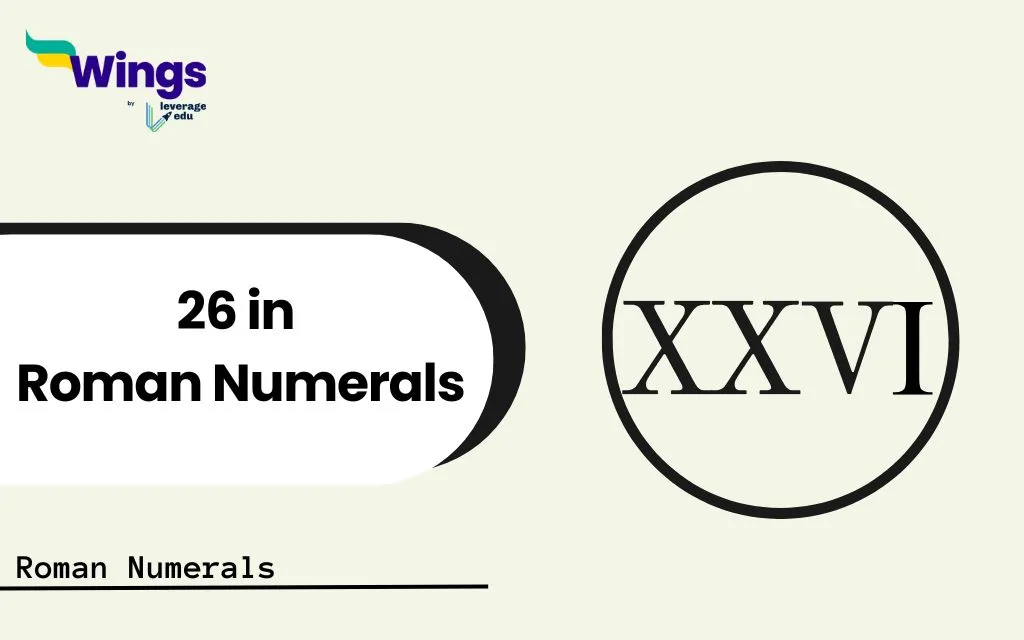Roman numerals have a timeless charm, connecting us to the rich history of ancient Rome. Whether you’re decoding clock faces, movie sequels, or historical dates, understanding this numeric system can be fascinating. If you’re wondering how to write 26 in Roman numerals, the answer is XXVI. By breaking it down into its components—20 (XX) and 6 (VI)—this simple yet elegant representation showcases the beauty of combining logic with tradition. Let’s explore more about Roman numerals!
Contents
How to Write 26 in Roman Numerals?
In the Roman number system, 26 is represented as XXVI. Understanding the symbols and characters needed to write Roman numerals helps you to grasp and write various numbers in Roman. The table below shows 26 in Roman numerals.
| Number | Roman Numeral |
| 26 | XXVI |
Here is a breakdown of how to write 26 in Roman numerals:
Step 1: Break down 26 into parts:
Roman numerals are written by adding or subtracting values. Start by finding the largest Roman numeral value less than or equal to 26.
- The largest value less than or equal to 26 is 20.
Step 2: Determine how many times 10 fits into 26:
- 26 ÷ 10 = 2 remainder 6.
- Write X (10) two times will signify 20.
- XX represents 20 (10+ 10= 20).
Step 3: Handle the remainder (6):
- The value 6 is represented as VI.
Step 4: Combine the parts:
- Add the representations together: XX (20) + VI (6) = XXVI
How to Convert XXVI to Number?
To convert XXVI from Roman numerals to a number, it is necessary to understand the significance of these symbols. In the number system, XXVI equals 26. The table below will help you through the process of converting XXVI to numbers.
| To convert XXVI to a number, add the values of each Roman numeral: X = 10VI = 6 Writing X(10) two times represent 20.X+ X= XXXX= 20 Now, sum them up:20 + 6= 26 So, XXVI = 26 |
Check out Roman numbers from 21 to 30 here:
| 21 in Roman Numerals | 26 in Roman Numerals |
| 22 in Roman Numerals | 27 in Roman Numerals |
| 23 in Roman Numerals | 28 in Roman Numerals |
| 24 in Roman Numerals | 29 in Roman Numerals |
| 25 in Roman Numerals | 30 in Roman Numerals |
Exercises on 26 in Roman Numerals
Let us solve interesting mathematical questions related to 26 in Roman numerals and Roman Numbers in general. You will also get answers to the questions in this section.
Addition and Subtraction
Solve the following addition or subtraction problems here:
- 20 + 6 = ___
- 34- 8 = ___
- 26+ 10= ___
- 50 – 35 = ___
Answers:
- XXVI
- XXVI
- XXXVI
- XV
Convert to Roman Numerals
What is the Roman Number for the following Numbers
- 28
- 23
- 25
- 30
Answers:
- 28 = XXVIII
- 23 = XXIII
- 25 = XXV
- 30 = XXX
Convert to Numbers
Convert the following Roman numerals to numbers:
- XXI
- XXV
- XX
- XXIX
Answers:
- XXI = 21
- XXV = 25
- XX= 20
- XXIX = 29
Match the Following
Match the following numbers to Roman numerals:
| Numbers | Roman Numerals |
| (i) 26 | (a) XXVIII |
| (ii) 28 | (b) XXII |
| (iii) 24 | (c ) XXVI |
| (iv) 22 | (d) XXIV |
Answers:
26 → c) XXVI
28 → a) XXVIII
24 → d) XXIV
22 → b) XXII
Learn about other Roman Numerals here:
FAQs
Ans: 24 is a Roman numeral in XXIV
Ans: XX = 20
Ans: 40 – 22= 18
18 = XVIII
Ans: X = 10
VII = 7
Writing X(10) two times represents 20, 10 +10=20
XX= 20
Now, sum them up:
20 + 7= 27
So, XXVII = 27.
Ans: No, XXVI is 26 and 27 is written as XXVII.
Ans. 29 is written as XXIX
Ans: XL= 40
XX= 20
Therefore, 40- 20= 20
20 = XX
Ans: 30 is written as XXX in Roman numerals.
Ans: Roman numerals are a numeral system originating from ancient Rome, using combinations of letters from the Latin alphabet (I, V, X, L, C, D, M) to represent numbers.
Ans: The largest standard Roman numeral is MMM, representing 3,000. Larger numbers are expressed using overlines or alternative systems.
Ans: Smaller numerals placed before larger ones indicate subtraction (e.g., IV = 4, IX = 9).
Ans: Instead of IL, 49 is written as XLIX because the Roman system avoids subtracting more than one numeral.
Ans: The basic symbols are:
I = 1
V = 5
X = 10
L = 50
C = 100
D = 500
M = 1,000
Ans: No, the Roman numeral system does not have a symbol for zero.
Ans: For large numbers, a bar placed above a numeral indicates multiplication by 1,000 (e.g., V‾\overline{V}V = 5,000).
Ans: Yes, Roman numerals are used for clocks, book chapters, movie sequels, and formal events like the Olympics or monarch numbering.
For more blogs on school education, follow Leverage Edu now.


 One app for all your study abroad needs
One app for all your study abroad needs












 60,000+ students trusted us with their dreams. Take the first step today!
60,000+ students trusted us with their dreams. Take the first step today!